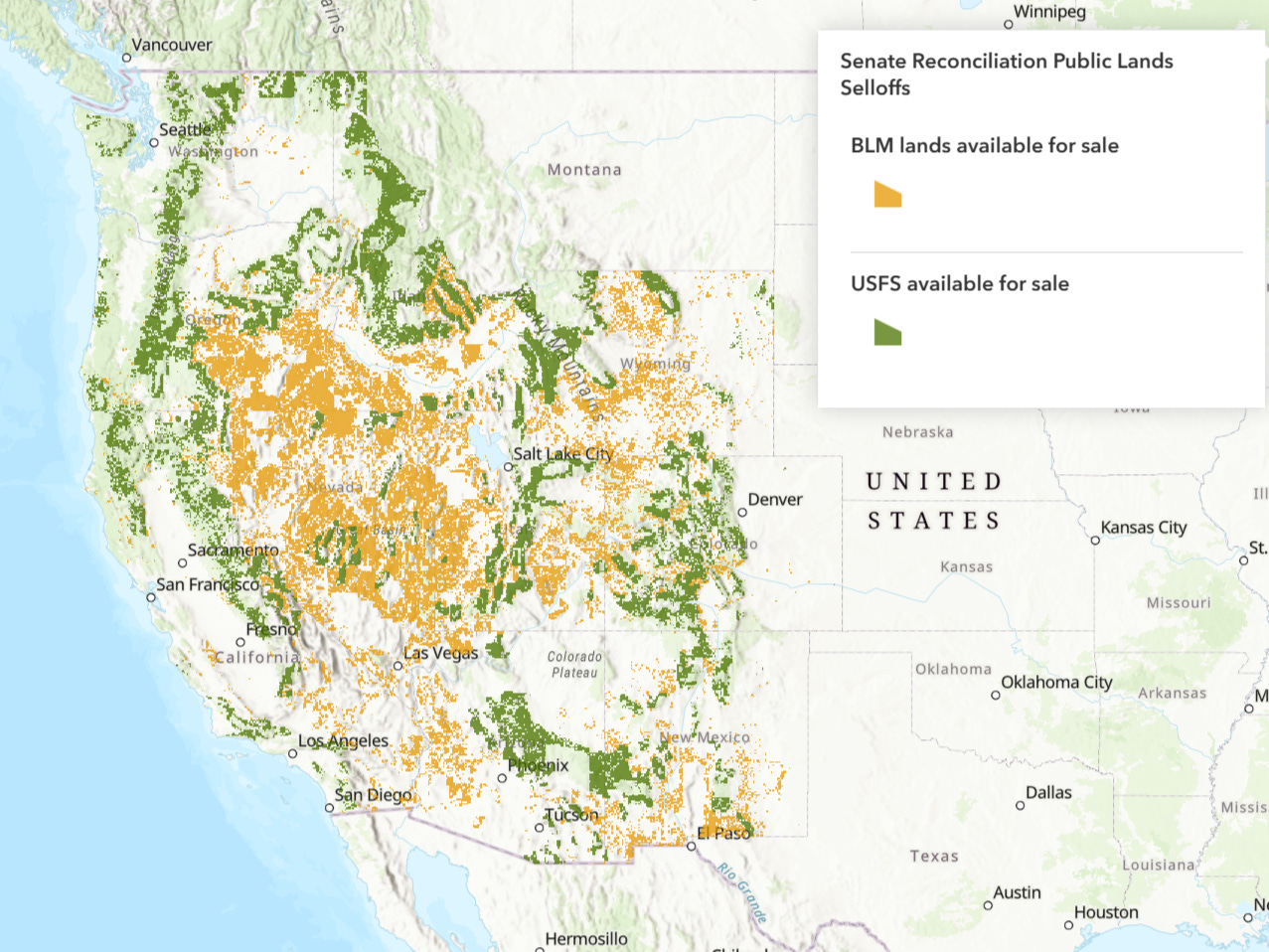250 Million Acres of Public Lands Are Now Up for Grabs
Mike Lee wants to sell half of all BLM and USFS lands.
In the most sweeping threat to American public lands in modern memory, the U.S. Senate is advancing a plan that opens the door to selling off a staggering 250 million acres of federal lands.
That’s more than half of all public lands managed by the Bureau of Land Management (BLM) (247 million acres total) and the U.S. Forest Service (USFS) (193 million acres total).
Let that number sink in: 250 million acres. That’s just below the combined size of Texas and California. And it’s not hyperbole.
(For the record and for comparison, the National Park Service manages 85 million acres.)
Buried in the Senate Energy and Natural Resources Committee’s draft budget reconciliation package is language that would mandate—require—the sale of 2.2 to 3.3 million acres of federal public lands in the next five years and, crucially, make more than 250 million acres eligible for similar treatment moving forward, according to The Wilderness Society.
What was once unthinkable—mass liquidation of American public lands—is now not only possible but actively being planned.
This is not about “excess” land. This is about gutting an American birthright.

A Quiet Revolution with Massive Consequences
The legislative language may sound mundane—phrases like “disposal of isolated tracts”—but make no mistake: this is a radical change in public lands policy.
Since the late 20th century, bipartisan consensus has largely held that America’s federal lands are meant to be managed in perpetuity, for multiple uses and future generations. That consensus is now fracturing.
The proposal allows lands to be sold off under vague criteria with few checks: anything “identified for disposal” by bureaucratic discretion is fair game.
And while national parks, monuments, and wilderness areas are explicitly exempt, the vast majority of public lands—including roadless forests, wildlife corridors, migration zones, sagebrush steppe, and traditional tribal territories—are not.
These are the wild places that sustain biodiversity, clean water, clean air, and outdoor recreation opportunities like hunting, fishing, hiking, kayaking, rock climbing, nature photography, mushroom foraging, horseback riding—the very idea of the American West.
Now, they’re on the auction block.
Not Just a Land Grab—A Moral Failure
Some defenders claim this is a reasonable tool for local development and housing. But nowhere in the legislation is there a guarantee that these lands will serve working-class Americans.
Nothing ensures that they’ll be used for affordable housing, tribal stewardship, or climate resilience.
In fact, once sold, these lands could just as easily become luxury developments, mining sites, private hunting retreats, or simply fenced off by the highest bidder.
There’s a cruel irony here. Even as Western communities suffer from housing shortages, droughts, and wildfires—issues that require more public land stewardship, not less—this plan pretends that liquidation is a solution. It is not. It is a short-sighted cash grab masquerading as reform, with irreversible consequences.
Worse still, some senators who support this proposal, especially Sen. Mike Lee of Utah who chairs the Senate’s Energy & Natural Resources committee responsible for this abomination, have long championed state takeovers and privatization schemes.
This isn’t about solving a problem. It’s about ideology. It’s about dismantling the very idea of shared national ownership of land.


What Happens When the People Lose Their Land?
Public lands are more than map coordinates. They are sacred places—elk calving meadows in Colorado, remote trout streams in Montana, ancestral tribal lands in Arizona, silent piñon forests in New Mexico. These are places where Americans can walk freely, sleep under stars, and remember who we are and where we come from.
They are also economic engines. The outdoor recreation economy generates $1.1 trillion annually and supports over 5 million jobs.
Who benefits when these lands are sold? Real estate developers? Foreign investors? Mining interests? Because it won’t be the rural guides, outfitters, campground hosts, and community leaders who depend on access to open, wild places.
Let’s not pretend this is some minor legislative tweak.
If Congress greenlights this sell-off, it will be the largest divestment of public land since the 19th-century railroad giveaways. And we will have no one to blame but ourselves.
Additionally, and importantly, this is not just “barren land next to highways with existing billboards that have no recreational value,” as Interior Secretary Doug Burgum claimed during a recent Senate hearing.
These lands, as the maps created by The Wilderness Society and Western Watersheds Project show, are often near or even right next the very borders of national parks and other National Park Service units.






“This is an enormous land grab—handing over millions of acres of public lands to private interests while pretending to care about affordable housing for western communities. These lands are our communities’ easy access to trailheads, hiking paths, bird watching areas, and the well-understood benefits of being in nature.”- Greta Anderson, deputy director of Western Watersheds Project.
We Must Raise Our Voices—Now
The Senate’s reconciliation package is moving fast.
Now is the time for citizens to act. Call your senators. Write to your local papers. Demand that Congress strip the public lands provision from the budget. Organizations like The Wilderness Society, Backcountry Hunters & Anglers, and the Outdoor Alliance are already mobilizing. We need every voice.
Because once these lands are gone, they are gone forever.
In America’s constitutional federal republic, the people own the land. The government manages it in trust. This trust is now being violated at historic scale. We must not allow a quarter-billion acres of the American public domain to disappear quietly into private hands.
Here’s How to Take Action to Protect Public Lands
There are a number of easy and convenient ways to voice your opposition to the selling of public lands:
Call your senator at 202-224-3121.
Contact your senator via 5calls.org.
Fill out the “Stop the Senate’s Plan to Sell Off Public Lands” form provided by Outdoor Alliance.




